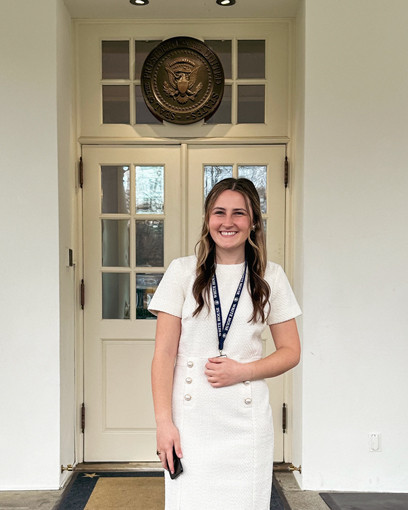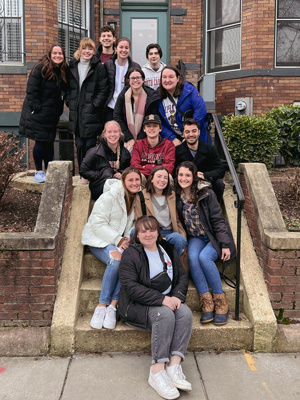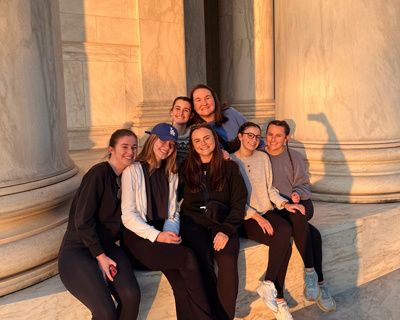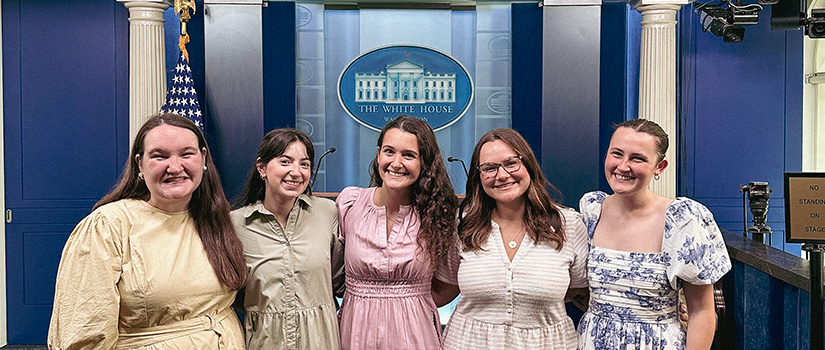Top photo: Blair Elliott (end right) with friends on a West Wing tour in Washington, D.C.

Last spring, a group of University of South Carolina students participating in the Washington Semester Program headed to the West Wing of the White House for a tour. There, they met their guide, Blair Elliott, special assistant for health and veterans and immigration, Domestic Policy Council. If any student felt a little intimidated to interact with a White House staffer, Elliott had a surprise to share: She’d been in their place only a year before.
“The Washington Semester Program was probably one of the most influential experiences throughout college,” the 2023 Stamps scholar and South Carolina Honors College graduate reflects. “It was one of the best decisions I made.”
As Elliott led the students around the West Wing, she told the building’s story, sharing information about the leaders who have inhabited it, explaining the day-to-day operations and greeting her coworkers. And perhaps at this point the students would begin to wonder about another story: Elliott’s own journey to the White House and the supportive community she fostered along the way.
Intersecting interests
When Elliott began at USC, she realized that she’d need a specific plan for investigating environmental science, political science and marine science. Andrea Tanner, associate dean of the Honors College, encouraged her to create an integrated studies (BARSC) major to explore those fields through the lens of environmental policy.
One of Elliott’s most influential classes was Principles of Leadership, taught by Ben Rex, founder and CEO of Cyberwoven, and Stephen Benjamin, who was mayor of Columbia at the time; Benjamin is now assistant to the President, senior advisor to the President and director of public engagement. “I’m really grateful for that class and that the professors were both business leaders and political leaders,” says Elliott. “Just a wonderful experience to get close to professors — I admire both of them and the work they do — and then also get close to the people in my class.”
Community was just as important to Elliott as academics, and as her time at USC progressed, she would join two more cohorts that would shape her journey. As a sophomore, she and four other USC students earned the NOAA Hollings Scholarship, which provides $19,000 in scholarship funding and a paid summer internship at a NOAA facility between junior and senior year. With encouragement from the national fellowships team and her peers, she reached out to the director of the Office of Legislative and Intergovernmental Affairs in D.C. to ask about interning and successfully secured an opportunity.

Passion for public service
Before the NOAA internship, Elliott would spend her junior spring in the nation’s capital for the Washington Semester Program. She and her cohort lived in a house near Capitol Hill, interning by day and taking classes by evening. Though she was still passionate about environmental policy, Elliott expanded her knowledge by interning with the Domestic Policy Council — the very team for which she is now the special assistant.
“I wouldn’t have ever been able to do this internship without the D.C. program, and the internship is directly the reason why I was able to go into being hired into the full-time role,” she says. “The things that I was able to learn in the internship have made me much more comfortable with the work.”
The opportunity to work with the Domestic Policy Council required Elliott to graduate a semester early, and with Tanner’s guidance, she was able to make that happen. In January, she began her special assistant role and is thrilled to work on “an incredible team with incredible people and mentors who really invested in me.”
She now focuses on environmental and climate health and has also worked on nutrition policy. One recent effort is the White House Challenge to End Hunger and Build Healthy Communities, which generated nearly $1.7 billion from the private sector to end hunger and reduce diet-related diseases by 2030. Elliott started working on this initiative as an intern and could celebrate its achievements as a staff member. She appreciates the opportunity to “see the tangible impact of the policies we’re working on and how they’re impacting communities.”
The tour comes full circle
Outside of the office, another community occupies Elliott’s time: Several members of her Washington Semester Program cohort have also moved to D.C.

“I think the support system that I found at USC, both from faculty and staff, but also from a friendship perspective, is the best community I’ve ever had, and I miss it every day. But I also feel like it’s very much followed me, even though I left.” She’s grateful for these supportive connections, especially as she navigates her fledgling career in public service.
Though no two days in the West Wing are ever the same, there is one aspect that remains constant. As her tour for USC students ended, she would have told them: It is an honor to work in the White House.
“I never would have dreamed in my wildest dreams that I could work where I work now, and every morning the awe never wears off. I’m just so grateful every day when I walk in,” she says. “In some ways, the longer you work there, it’s like, ‘Oh, this is where I work.’ And then you walk out and see the White House and you’re like, ‘Oh, this is where I work.’ It’s a continual spiral of sinking in again and again: ‘Whoa, it’s really cool that I work here.’”
